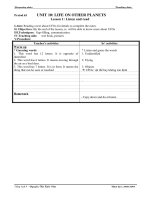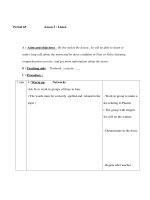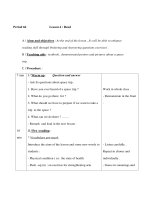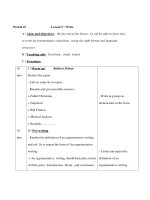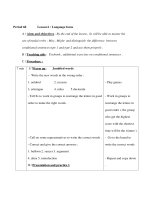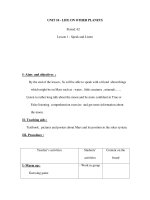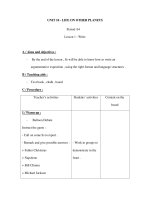Unit 10. Life on other planets
Bạn đang xem bản rút gọn của tài liệu. Xem và tải ngay bản đầy đủ của tài liệu tại đây (118.89 KB, 4 trang )
<span class='text_page_counter'>(1)</span><div class='page_container' data-page=1>
<b>Period: 67</b>
<b>LANGUAGE FOCUS</b>
<b>I. Objectives</b>
<i><b>1. Knowledge, Skills, Attitude: </b></i>
<i><b>a. Knowledge:</b></i>
- By the end of this lesson, Ss do exercises on modals (may, might), conditional sentences type 1 and 2.
<i><b>- Vocabulary: Related to life on other planets.</b></i>
<i><b>- Grammar:</b></i> May / might + V; Conditional sentences type 1 and 2.
<i><b>b. Skills: listening, speaking, reading and writing</b></i>
<i><b>c. Attitude: not available.</b></i>
<i><b>2. Capacity is formed and developed for students</b></i>
- Self-learning capability.
- Communicative competence
- Cooperation capacity
<b>II. Preparation</b>
<i><b>1. Teacher: lesson plane, book, color chalks, pictures, MP3</b></i>
<i><b>2. Students: books, notebooks, pen, ruler …</b></i>
<b>III. Students’ activities</b>
1. Warm up (5’)
<i><b>Teacher’s and students’ activities</b></i> <i><b>Content</b></i>
- T ask Ss to say some modal verbs and writes on the board.
- Ss say.
* Modal verbs:
can, could, ...
<i><b>2. Knowledge formation activities (36’)</b></i>
- T introduces the formation and the usage of
<b>may and might.</b>
- T has students look at the pictures on page
89-90 to do exercise in Language Focus 1.
- T gets students to work in pairs. They have
to practice asking and answering.
- Ss work in pairs.
- T calls some pairs to ask and answer before
the class.
- T checks and corrects mistakes if
necessary.
<b>1. Work with a partner. Use may or might and talk </b>
<b>about Andy’s presents.</b>
<i>* Ss remember modal verbs and the way to use them.</i>
<i><b>* Form : May/Might + infinitive </b></i>
<i><b>*Use:</b></i>
* May/Might is used to talk about present or future
possibility.
* Might is normal a little less sure than May.
a. Ex: S1: What may it be?
S2: It may be a look or it might be a game.
b. What may it be?
It may be a box of crayons or it might b a box of plaint.
c. What may it be?
It may be a football or it might bad a basketball.
d. What may it be?
It may be a boat or it might be a train
e. What may it be?
It may be a flying saucer or it might be a meteor.
f. What may it be?
It may be an evening star or it might be a spacecraft.
- T explains the requirement of the exercises
and does example a.
- Ss pay attention to teacher.
- T has Ss complete the sentences from b to e.
- Ss do the exercises individually and then
compare the answers.
- T calls some Ss to give the answers.
- T checks and corrects mistakes if
necessary.
- Ss take notes.
<b>2. Complete the sentences. Use the verbs in the box.</b>
<i>* Ss remember the conditional sentences type 1.</i>
Ex: If it <i>rains</i> this evening, I <i>won’t go</i> out.
b. Lan will miss the bus if she does not hurry.
c. If Ha is not careful, he’ll drop the cup.
d. Mrs. Nga will join us if she finishing her works early.
e. If Mrs. Binh writes a shopping list, she won’t forget
what to buy.
- T introduces the structure and the usage of
conditional sentence type 2.
</div>
<span class='text_page_counter'>(2)</span><div class='page_container' data-page=2>
- T sets the scene: Ba is not rich, so he can’t
travel around the world and asks students to
complete the sentences.
- T has Ss look at the pictures, use suggested
words to complete the sentences.
- Ss do the exercises individually and then
compare the answers.
- T calls some Ss to give the answers.
- T checks and corrects mistakes if
necessary.
- Ss take notes.
<i>* Ss remember the conditional sentences type 2.</i>
<i>* Form :</i> Main Clause: S + would/ could/ might + V
<b>If Clause: past simple tense/ past subjunctive</b>
<i>* Use: </i>We use this structure to talk about unreal or
unlikely present of future situations.
* If Ba ………rich, he ……around …………
<i>* Answer keys:</i>
If Ba were rich, he would travel around the world.
<i>* Answer keys:</i>
a. If Mr. Loc had a car, he would drive to work.
b. If Lan lived in Ho Chi Minh City, she should visit
SaiGon Water Park.
c. If Nam had an alarm clock, he would arrive at school
on time.
d. If Hoa lived in Hue, she would see her parents every
day.
e. If Nga owned a piano, she would play it very well.
f. If Tuan studied harder, he would get better grades.
g. If Na had enough money, she would buy a new
Computer.
(Na would buy a new Computer if she had enough
money)
- T gives the topic and asks students to
discuss in groups before writing.
- T gives an example first.
- T has each student write 3 things he/she
would like to do.
- T gets students to share with their partners.
- T calls on some students to write their
sentences on the board..
- T gives feedback and corrects if necessary.
- Ss take notes.
<b>4. What would you do if you met an alien from outer </b>
<b>space? Write 3 things you would like to do.</b>
<i>* Ss use the coditional sentences to write the things they</i>
<i>live to do.</i>
<b>EX: If I met an alien from outer space, I would invite </b>
him/her to my home and talk.
<i><b>3. Consolidation 4’</b></i>
T calls some Ss to tell something they would like to do if they met an alien from outer space.
<b>IV. Experience:</b>
………
………
………
<b>Period: 68</b>
<b>TEST 15’ and REVISION</b>
<b>I. Objectives</b>
<i><b>1. Knowledge, Skills, Attitude: </b></i>
<i><b>a. Knowledge:</b></i>
- To help students remember some tenses they have studied.
<i><b>- Vocabulary: Past simple, present simple, future simple, present perfect, present progressive and</b></i>
past progressive tense.
<i><b>- Grammar: </b></i>
<i><b>b. Skills: listening, speaking, reading and writing</b></i>
<i><b>c. Attitude: Study hard.</b></i>
<i><b>2. Capacity is formed and developed for students</b></i>
- Self-learning capability.
- Communicative competence
- Cooperation capacity
</div>
<span class='text_page_counter'>(3)</span><div class='page_container' data-page=3>
<i><b>1. Teacher: lesson plane, book, color chalks, pictures, MP3</b></i>
<i><b>2. Students: books, notebooks, pen, ruler …</b></i>
<b>III. Students’ activities</b>
<i><b>1. Test 15’</b></i>
<i><b>I. Match column A with column B that has the same meaning (2 ms).</b></i>
<b>A</b> <b>B</b> <b>Answer</b>
1. If we work hard, a. if you study well. 1. ...
2. If you saw a UFO, b. if you met a lien from outer space? 2. ...
3. What would you do c. What would you do? 3. ...
4. You will pass your exam d. we will have much money. 4. ...
<i><b>II. Choose the best answer a, b, c or d to comolete the following sentences (3 ms).</b></i>
1. If you ... to improve your English, we can help you.
a. wanted b. wants c. to want d. want
2. He ... your party birthday if she invites him.
a. come b. came c. will come d. would come
3. It may ... a ball.
a. is b. be c. are d. am
4. They would ... part in out door activities.
a. take b. took c. taking d. takes
5. If Hoa lived in Hue, she ... her parents .
a. see b. would see c. saw d. sees
6. If Lan ... in HCM city, she would visit Saigon Warter Park.
a. live b. would live c. lived d. lives
<i><b>III. Fill in the blanks with the correct forms of the verbs: (3 ms).</b></i>
1. She will do her homework if she ... (have) free time.
2. If Huong comes into my room, please ... (call) me.
3. If you speak English every day, you ... (develop) your speaking skill.
4. They would borrow your motobike if they ... (not have) it.
5. If Lan bought a book, she ... (read) it.
6. They may ... (play) soccer because they completed their work.
<i><b>IV. Complete the sentences with the words given. Use coditional sentences: type 1 and 2 (2 ms).</b></i>
1. I/ will help/ him/ if/ she/ ask/ me.
2. If/ it/ be/ fine today/ I/ will go/ swim.
3. We/ would stay/ home/ if tomorrow/ be/ sunday.
4. If/ Lan/ be/ rich/ would travel/ around the world.
<i><b>2. Answer keys</b></i>
<i><b>I. Match column A with column B that has the same meaning (2 ms).</b></i>
1 + d 2 + c 3 + b 4 + a
<i><b>II. Choose the best answer a, b, c or d to comolete the following sentences (3 ms).</b></i>
1. d. want 2. c. will come 3. b. be 4. a. take 5. b. would see 6. c. lived
<i><b>III. Fill in the blanks with the correct forms of the verbs: (3 ms).</b></i>
1. has 2. call 3. will develop 4. did not have 5. would read 6. play
<i><b>IV. Complete the sentences with the words given. Use coditional sentences: type 1 and 2 (2 ms).</b></i>
1. I will help him if she asks me.
2. If it is fine today, I will go swimming.
3. We would stay at home if tomorrow was sunday.
4. If Lan was rich she/ he would travel around the world.
<i><b>1. Warm up (5’)</b></i>
<i><b>Teacher’s and students’ activities</b></i> <i><b>Content</b></i>
- T asks ss to say the structure of the past
simple tense and write on the board.
- Ss say.
* S + V-ed/V (past form) … .
<i><b>2. Knowledge formation activities (21’)</b></i>
-Teacher has students remember the
usage, the adverbs and the formation of
<b>1. Present simple tense.</b>
</div>
<span class='text_page_counter'>(4)</span><div class='page_container' data-page=4>
the present simple tense.
-Students remember and state before the
class.
-Teacher checks and corrects.
-Students copy down the usage, the
adverbs and the formation of this
tense.Then give some examples.
-Teacher corrects if necessary.
<i><b>*usage:expressing habitual or everyday activity, used for </b></i>
general statements of fact,… .
<i><b>*Adverbs : sometimes, often, usually, always, never, </b></i>
every….
<i><b>*Formation :</b></i>
-S + V-s / -es + … .
-S +don’t / doesn’t + V (bare inf.) + … .
-Do / Does + S + V (bare inf.) + … ?
Ex:-Hoa cleans the floor every day.
-Hoa doesn’t clean the floor every day.
-Does Hoa clean the floor every day?
-Teacher has students remember the
usage, the adverbs and the formation of
the present perfect tense.
-Students remember and state before the
class.
-Teacher checks and corrects.
-Students copy down the usage, the
adverbs and the formation of this
tense.Then give some examples.
-Teacher corrects if necessary.
<b>2. Future simple tense</b>
<i>* Ss remember the way to use the future simple tense.</i>
<i><b>*Usage:expressing an action will happen in the future.</b></i>
<i><b>*Advebs: tomorrow, tonight, next week / month / year / …, </b></i>
on the weekend,… .
<i><b>*Formation :</b></i>
-S + will / shall + V (bare inf.) + … .
-S + won’t / shan’t + V (bare inf.) + … .
-Will / Shall + S + V (bare inf.) + … ?
<i><b>Ex:- Minh will come here next summer.</b></i>
-Minh won’t come here next summer.
-Will Minh come here next summer?
-Teacher has students remember the
usage, the adverbs and the formation of
the past simple.
-Students remember and state before the
class.
-Teacher check and correct.
-Students copy down the usage, the
adverbs and the formation of the past
simple tense.Then give some examples.
-Teacher checks and correct if necessary.
<b>3. Past simple tense</b>
<i>* Ss remember the way to use the past simple tense.</i>
*usage :expressing an action happened and finished at a
particular time in the past.
<i><b>*Adverbs : yesterday, last night / week / month / year.. ago.</b></i>
<i><b>*Formation : </b></i>
-S + V-ed/V (past form) … .
-S + didn’t + V (bare inf.) … .
-Did + S + V (bare inf.) … ?
<i><b>Ex:-Lan bought a new hat yesterday.</b></i>
-Lan didn’t buy a new hat yesterday.
-Did Lan buy a new hat yesterday?
<i><b>3.Consolidation 4’</b></i>
- T says the ways of using the grammar above.
<b>IV. Experience:</b>
………
………
………
<b>Signature of the Leader</b>
</div>
<!--links-->
